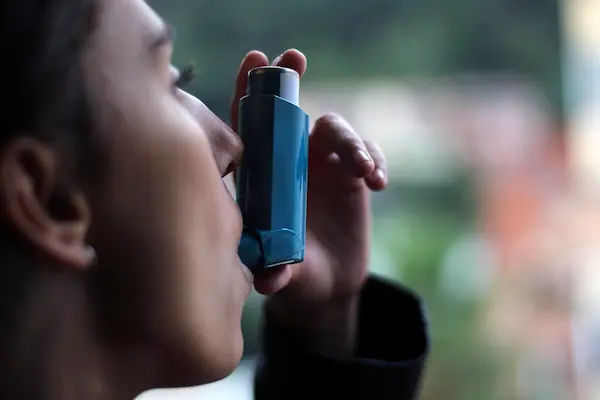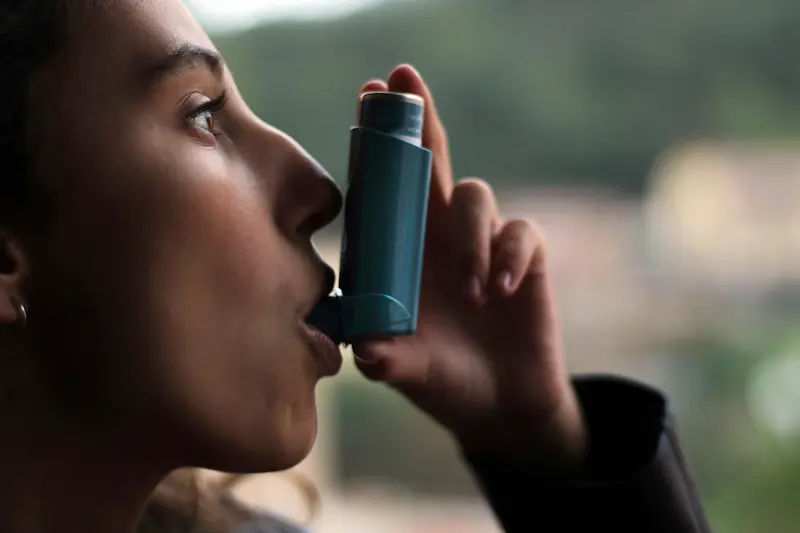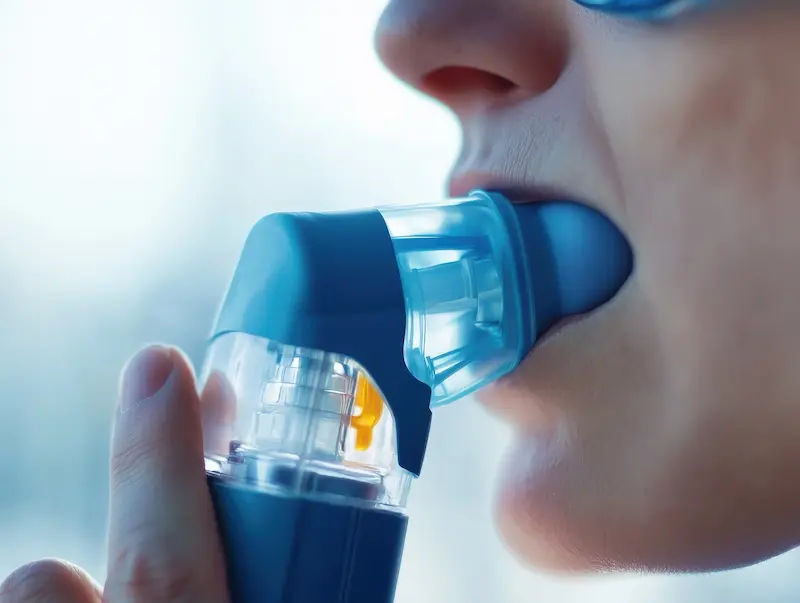Guide to Living With Asthma
Understand how to live well with asthma through effective management, medication, and lifestyle changes. Explore tips for symptom control, triggers to avoid, and long-term care for a healthier, active life.


Living with asthma can feel daunting. The sudden tightness in your chest, the whistling sound of a wheeze, and the struggle for a full breath are experiences millions know all too well. But here’s the most important thing to remember: asthma is a manageable condition. With the right knowledge, tools, and support, you can absolutely lead a vibrant, active, and unrestricted life. This comprehensive guide is designed to empower you. We will walk you through everything from understanding what asthma is and identifying your unique triggers to mastering your medication and creating a personalised action plan. Whether you’ve been recently diagnosed or are supporting a loved one, consider this your roadmap to taking control of your breathing and your life.
What is Asthma?
Asthma is a chronic respiratory condition that affects the airways in your lungs. These airways, or bronchial tubes, become inflamed, swollen, and overly sensitive to various triggers. This heightened sensitivity is known as hyperresponsiveness.
How Do Your Airways Work?
Normally, when you breathe, air flows freely through your windpipe (trachea) into bronchial tubes that branch out into your lungs. These tubes are lined with muscles and a mucous membrane. In a healthy person, these muscles are relaxed, allowing easy passage of air.
What Happens During an Asthma Attack?
When a person with asthma encounters a trigger, three key things happen, making breathing difficult:
- Inflammation: The lining of the airways becomes swollen and irritated.
- Bronchospasm: The muscles surrounding the airways tighten and constrict.
- Mucus Production: The cells in the airways produce excess thick mucus, further clogging the narrowed passages.
This combination of factors leads to the classic symptoms of an asthma attack: coughing, wheezing, chest tightness, and shortness of breath.
Recognising the Signs
Asthma symptoms can vary from person to person and can change over time. You might experience all of them or just a persistent cough. Common signs include:
- Shortness of breath, especially after physical activity or at night.
- Wheezing, a whistling or squeaky sound when you breathe out.
- Chest tightness, feeling like a band is squeezing your chest or something is sitting on it.
- Coughing, often worse at night or early in the morning. This can be the main or only symptom for some people (a
condition known as cough-variant asthma).
Symptoms in Adults vs. Children
While the core symptoms are the same, they can present differently. Children may have more intermittent symptoms triggered by colds, while adults often experience more persistent symptoms. It's also crucial to recognise signs of poorly controlled asthma, such as needing your rescue inhaler more than twice a week, symptoms that wake you up at night, or asthma that limits your daily activities.
What Triggers Your Asthma?
A trigger is anything that irritates your airways and sets off your asthma symptoms. Triggers are highly individual, and identifying yours is the first step toward prevention.
Environmental and Allergy Triggers
- Airborne Allergens: Pollen from trees and grasses, mould spores, pet dander (from animals with fur or feathers), and dust mite droppings are very common.
- Irritants: Strong smells (perfume, cleaning products), smoke (tobacco, wildfire), air pollution, and cold air can provoke symptoms.
Consult Top Specialists
Activity and Health-Related Triggers
- Exercise: Known as exercise-induced bronchoconstriction (EIB), this is very common but manageable with proper medication and warm-up techniques.
- Respiratory Infections: Colds, the flu, and sinus infections are major triggers for both children and adults.
- Strong Emotions: Stress, laughter, shouting, or crying can change your breathing pattern and act as a trigger.
Medications and Management
Asthma treatment typically involves two main types of medication, often delivered via inhalers for direct action in the lungs.
Quick-Relief Medications
These are short-acting bronchodilators (like albuterol). They work rapidly to relax the tightened muscles around your airways, providing relief within minutes during an asthma attack. They are not for daily use; frequent use signals that your asthma is not under control.
Long-Term Control Medications
These are the cornerstone of managing persistent asthma. Taken daily, they reduce underlying inflammation and prevent symptoms from occurring. This category includes inhaled corticosteroids (e.g., fluticasone, budesonide), combination inhalers, and leukotriene modifiers (pill form).
The Right Way to Use Your Inhaler
This is critical. Studies show that up to 70-90% of people don't use their inhalers correctly, leading to poor medication delivery and uncontrolled symptoms. If your condition does not improve after trying these methods, consult a doctor online with Apollo24|7 for further evaluation and a demonstration of proper technique.
Your Asthma Action Plan
Created with your doctor, a written asthma action plan is your personalised guide for daily management and emergency response. It’s typically colour-coded into three zones:
The Green, Yellow, and Red Zones Explained
- Green Zone (Doing Well): You have no symptoms and can do your usual activities. The plan outlines your daily controller medicines.
- Yellow Zone (Caution): You are experiencing symptoms. The plan specifies which rescue medicine to take and when to contact your doctor.
- Red Zone (Medical Alert): You are having a severe attack. Symptoms are not improving with rescue medicine. The plan gives clear instructions to seek emergency care immediately.
Conclusion
Living with asthma is not about living with limitation; it’s about living with knowledge and preparedness. By understanding your body, avoiding your triggers, adhering to your medication regimen, and having a clear action plan, you hold the power to keep your symptoms in check. Remember, you are the most important member of your healthcare team. Stay proactive, communicate openly with your doctor, and don’t hesitate to seek help when you need it. With the right strategies in place, asthma becomes a background note in the symphony of a full, active, and healthy life. Take the first step towards better control today by reviewing your action plan or scheduling a consultation with a specialist.
Consult Top Specialists
Consult Top Specialists

Dr. S Mallikarjun Rao
Pulmonology Respiratory Medicine Specialist
22 Years • MBBS, MD (Pul.), FCCP
Hyderguda
Apollo Hospitals Hyderguda, Hyderguda
(100+ Patients)

Dr Rakesh Bilagi
Pulmonology Respiratory Medicine Specialist
10 Years • MBBS MD PULMONOLOGIST
Bengaluru
Apollo Clinic, JP nagar, Bengaluru

Dr Vishwa Vijeth K.
Pulmonology Respiratory Medicine Specialist
8 Years • MBBS, MD ( Respiratory Medicine)
Bangalore
Apollo Clinic Bellandur, Bangalore

Dr. Mary Susan K S
General Physician/ Internal Medicine Specialist
13 Years • MBBS, MD INTERNAL MEDICINE
Bengaluru
Apollo Clinic, Sarjapur Road, Bengaluru
(25+ Patients)

Dr. Chaithanya R
Internal Medicine Specialist Diabetologist
16 Years • MBBS, MD Internal Medicine, Fellowship in Diabetes(UK), CCEBDM(PHFI)
Bangalore
Apollo Clinic Bellandur, Bangalore
(75+ Patients)
Consult Top Specialists

Dr. S Mallikarjun Rao
Pulmonology Respiratory Medicine Specialist
22 Years • MBBS, MD (Pul.), FCCP
Hyderguda
Apollo Hospitals Hyderguda, Hyderguda
(100+ Patients)

Dr Rakesh Bilagi
Pulmonology Respiratory Medicine Specialist
10 Years • MBBS MD PULMONOLOGIST
Bengaluru
Apollo Clinic, JP nagar, Bengaluru

Dr Vishwa Vijeth K.
Pulmonology Respiratory Medicine Specialist
8 Years • MBBS, MD ( Respiratory Medicine)
Bangalore
Apollo Clinic Bellandur, Bangalore

Dr. Mary Susan K S
General Physician/ Internal Medicine Specialist
13 Years • MBBS, MD INTERNAL MEDICINE
Bengaluru
Apollo Clinic, Sarjapur Road, Bengaluru
(25+ Patients)

Dr. Chaithanya R
Internal Medicine Specialist Diabetologist
16 Years • MBBS, MD Internal Medicine, Fellowship in Diabetes(UK), CCEBDM(PHFI)
Bangalore
Apollo Clinic Bellandur, Bangalore
(75+ Patients)
More articles from Asthma
Frequently Asked Questions
1. Can asthma go away?
While some children may see their symptoms become less severe or disappear as they get older, asthma is generally a lifelong condition. Symptoms can wax and wane, but the underlying inflammation tendency remains. It's important to continue managing it even during symptom-free periods.
2. What is the difference between asthma and COPD?
Both cause breathing difficulties, but they are different. Asthma often starts in childhood and is linked to allergies and triggers, with symptoms that come and go. COPD (Chronic Obstructive Pulmonary Disease) is typically caused by long-term exposure to irritants like cigarette smoke and is characterised by progressively worsening symptoms.
3. How can I tell if my cough is asthma?
A chronic, persistent cough that worsens at night, occurs after exercise, or is triggered by known allergens could be a sign of cough-variant asthma. If over-the-counter cough medicines aren't helping, it's important to see a doctor for a proper diagnosis, which may involve spirometry tests to measure your lung function.
4. Is it safe to exercise if I have asthma?
Absolutely. Exercise is encouraged for overall health. The key is management. Using your prescribed rescue inhaler 15-20 minutes before exercise, properly warming up and cooling down, and choosing activities with intermittent breaks (like swimming or walking) can help prevent exercise-induced bronchoconstriction.
5. What are the signs of a severe asthma attack?
Seek emergency care immediately if you experience: extreme shortness of breath where you can only speak in short phrases, straining your chest muscles to breathe, no improvement after using your rescue inhaler, or a peak flow meter reading in the red zone.




